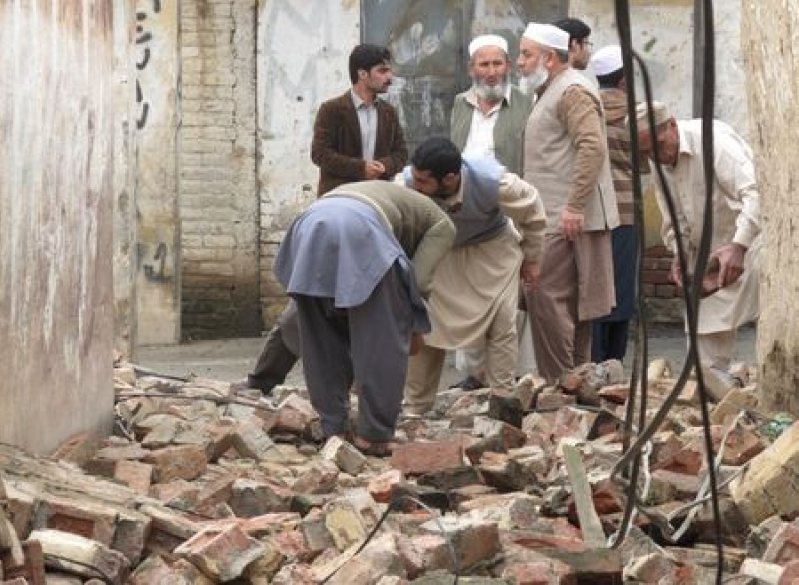
A powerful earthquake struck a remote area of Afghanistan on Monday, shaking the capital Kabul and killing at least 24 people while 76 were killed in neighboring Pakistan, officials said.
The death toll could climb in coming days because communications were down in much of the rugged Hindu Kush mountain range area where the quake was centered.
Reports of deaths had poured in from different areas of both countries by nightfall.
In one of the worst incidents, at least 12 girls were killed in a stampede to get out of their school in the northeastern Afghan province of Takhar.
"They fell under the feet of other students," said Abdul Razaq Zinda, provincial head of the Afghan National Disaster Management Agency, who reported heavy damage in Takhar.
Shockwaves were felt in northern India and in Pakistan, where hundreds of people ran out of buildings as the ground rolled beneath them.
"We were very scared ... We saw people leaving buildings, and we were remembering our God," Pakistani journalist Zubair Khan said by telephone from the Swat Valley northwest of the capital, Islamabad.
"I was in my car, and when I stopped my car, the car itself was shaking as if someone was pushing it back and forth."
The quake was 213 km (132 miles) deep and centered 254 km (158 miles) northeast of Kabul in Afghanistan's Badakhshan province.
The U.S. Geological Survey initially measured the quake's intensity at 7.7 then revised it down to 7.5.
Just over a decade ago, a 7.6 magnitude quake in another part of northern Pakistan killed about 75,000 people.
In Afghanistan, a total of 24 were reported dead on Monday including the 12 schoolgirls, seven people in the eastern province of Nangarhar, two in Nuristan province in the northeast and three in eastern Kunar province, officials said.
PHONES DOWN
In Pakistan, 38 deaths were reported by early evening, most in northern and northwestern regions bordering Afghanistan, officials told Reuters.
Particularly hard-hit in Pakistan was the northern province of Chitral, where 11 people were killed, police official Shah Jehan said, adding that the death toll was likely to rise because so many areas were cut off from communications.
Journalist Gul Hammad Farooqi, 47, said his house had collapsed.
"I was thrown from one side of the road to the other by the strength of the earthquake. I've never experienced anything like it," Farooqi said.
"There is a great deal of destruction here, and my house has collapsed, but thankfully my children and I escaped."
Further south, the city of Peshawar had one death but at least 150 injured people were being treated at the city's main hospital, the provincial health chief said.
In Afghanistan, international aid agencies working in northern areas reported that cell phone coverage in the affected areas remained down in the hours after the initial quake.
"The problem is we just don't know. A lot of the phone lines are still down," said Scott Anderson, deputy head of office for the U.N. Office for the Coordination of Humanitarian Affairs in Kabul.
Badakhshan provincial governor Shah Waliullah Adib said about 400 houses were destroyed but he had no figures on casualties.
"Right now we are collecting information," he said
The earthquake struck almost exactly six months after Nepal suffered its worst quake on record, on April 25. Including the toll from a major aftershock in May, 9,000 people lost their lives and 900,000 homes were damaged or destroyed.
The mountainous region is seismically active, with earthquakes the result of the Indian subcontinent driving into and under the Eurasian landmass. Sudden tectonic shifts can cause enormous and destructive releases of energy.
(Additional reporting in Kabul by James Mackenzie and Mirwais Harooni in Kabul. In Pakistan, additional reporting by Qasim Shah in Gilgit, Abu Arqam Naqash in Muzaffarabad, Haji Mujtaba in Bannu, Saud Mehsud in Dera Ismail Khan and Asad Hashim in Islamabad.; Writing by Kay Johnson.; Editing by Robert Birsel)






